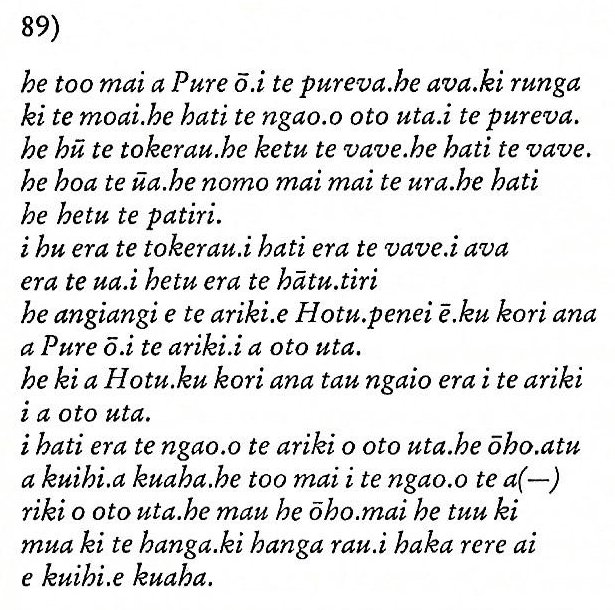
|
E:87 → 3
* 29 |
|
Four
lines of Easter Island script plus the
name Vaka.a Tea hiva:
=
segments from Br5, Br6, Br7, and Br8 (The
Eighth Land, p. 290.)
[cfr E:83] |
|
i te toru te
kauatu.o te raā.o tangaroa uri.he
ū(-) |
On the thirtieth day
of the month of October ('Tangaroa
Uri'), Hotu asked about the stone figure
(moai maea) named Oto Uta [te
moai.maea.ko oto uta.te ingoa]. |
|
i.a Hotu.i
te moai.maea.ko oto uta.te |
|
ingoa.he
ki.kia Teke.a Hotu.ihē te moai.
(corrected to a oto from a
hi(-)
corrected to uta from nariru).he
hakatopa.a
Teke. i roto a ia.i te ki |
Hotu said to Teke [he
ki.kia Teke.a Hotu],
'Where is the figure Oto Uta (corrected
in the manuscript for Hina Riru)?' |
|
Topa.
1. To bend down, to
drop to the ground; to fall on a certain
date. 2. To stop doing something, to
drop; ina ekó topa taau aga, do
not stop, keep doing your work. 3. To
remain, to be left over, to be
unfinished; he topa te kai, the
food is not finished, there is some
left. 4. To come to one's memory; i
te aamu he topa te vânaga tûai, in
the legends old words come to memory. 5.
To remember, to reflect (with mana'u
as subject); e-topa rivariva tokorua
mana'u ki te me'e nei, let the two
of you think carefully about this thing.
Vanaga. 1. Wine; topa tahaga, id.
2. To fall in drops, to descend, to go
down, to abdicate; topa iho, to
fall; hakatopa, to knock down, to
cause to fall; hakatopa ki raro,
to knock down, to subjugate. 3.
Childbirth, abortion; topa te poki,
to lie in. 4. A feast, to feast. 5. To
arrive, to result; topa rae,
newcome; topa iho, to come
unexpectedly; topa ke, to
deviate; topa no mai, topa
hakanaa, topa tahaga, mau
topa pu, unexpected; topa okotahi,
solitary; hakatotopa, to excite,
to foment. 6. Bad, low, cheap, failure;
igoa topa, nickname; ariga
topa, sinister, sly, ill-tempered,
to hang the head; hakatopa, to
disparage; hakatotopa,
irresolute. 7. (Of upward movement)
topa ki raro, to scale, to surpass;
hakatopa ki te ao, to confer a
dignity; hakatopa ki te kahu, to
spread a sail; hakatotopa, to
make a genealogy. Churchill.
Topatagi.
To
remember with sorrow, to miss, to pine
for (mo); ananake te raá he
topatagi te ûka riva ko Uho mo toona ga
matu'a, Ko Uho the good girl missed
her parents every day. Vanaga. Grief.
Churchill. |
|
he kī.
kia Hotu.a Teke.i mua i te hanga ana i
re(-) |
Teke thought about
the question [he hakatopa.a Teke. i
roto a ia.i te ki] and then said to
Hotu [he kī. kia Hotu.a Teke],
'It was left out in the bay.' [i mua
i te hanga ana i re(h)u
ro ia.] |
|
(h)u ro
ia.he ki a Hotu.kia Pure ō.kia Pure ki. |
Hotu said [he
ki a Hotu]
to Pure O [Ō], to Pure Ki, and to Pure
Vanangananga: 'You fellows (kope),
sail [ko
oho.korua ko nga kope]
to the friend (hoou),
to Oto Uta.
Bring him here [ ka
too mai],
he who is resting out there in the bay [i
mua.i te hanga].
Move him carefully (?
nee),
you fellows, so that the king, that Oto
Uta is not damaged!' [o
kori a i te ariki.i a oto uta.] |
|
kia Pure
vananganaga.ko oho.korua ko nga kope |
|
ki te
hoou.kia oto uta.ka too mai.ma e moe ena |
|
i mua.i te
hanga.he nee
korua ko nga kope.o kori a |
|
i te
ariki.i a oto uta. |
|
Gete.
M.: Whakangete,
to urge on a horse. Ngetengete,
to make a clicking sound with the
tongue. to click with the tongue, as to
a horse; to chirrup. To express surprise
or sorrow. Cf. ketekete, to
express surprise or regret. H.: neke,
an indistinct sound, as scratching on a
rough board; to make the noise of
scratching; to scratch. Cf. ekeeke,
to be in pain; displeasure, arising from
an offence; the feeling which one has
when that which he prizes is spoken
against or injured. T.: ete, to
flinch; eteete, to be shocked
disgusted, or ashamed. Cf. paete,
to be made angry. To.: cf. ketekete,
to chirrup; kekete, to chirp; to
chatter. Text Centre.
... I remember from
somewhere in Heyerdahl's books that he
considered it significant that
neke-neke was a special word in the
vocabulary of Easter Island, it meant
'walking without legs, walking by moving
the weight this side and that slowly
advancing forward'. He had discovered
the word when he asked how the statues
had been moved - they walked (neke-neke)
was the answer ...
Nahe.
Ta.:
Angiopteris erecta [maybe evecta?:
'Mule's-foot Fern']. Sa.: nase,
the giant fern. Churchill. Bishop
Jaussen: crustacé. Barthel. In Jamaica
the species Angiopteris evecta
['Mule's-foot Fern'] is widely
naturalized and is registered as an
invasive species. The plant was
introduced by Captain Bligh from Tahiti
as a staple food for slaves and
cultivated in the Castleton Gardens in
1860. From there it was able to
distribute itself throughout the eastern
half of the island. Wikipedia.
E:68a - 69a:
|
1 |
he |
ngaatu |
a Oti. |
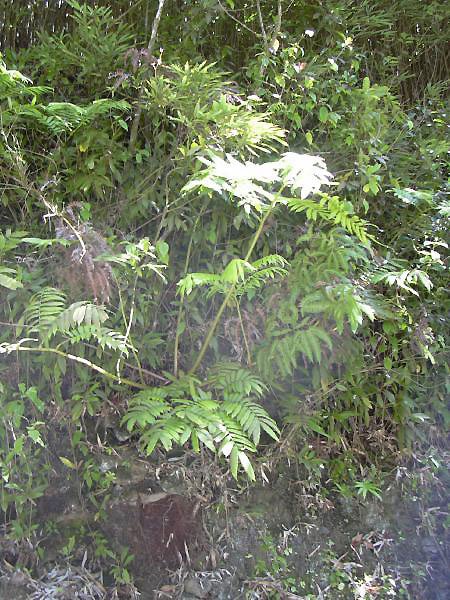 |
|
1 |
tavari |
|
1 |
riku |
|
1 |
ngaoho |
|
1 |
naunau. |
|
1 |
uku koko |
|
1 |
nehenehe |
|
1 |
poporo. |
|
1 |
kavakava atua |
|
1 |
kohe. |
|
1 |
nehenehe
[sic!] |
|
1 |
pua |
|
1 |
harahara |
|
1 |
hua taru. |
|
1 |
makere |
|
1 |
hata. |
|
1 |
tuere heu. |
|
1 |
tureme |
|
1 |
matie. |
|
1 |
pua nakonako. |
|
1 |
ipu ngutu |
|
|
E:88 → 22
* 4
'Yes, for he was a monstrous thing and
fashioned marvelously, nor was he like
to any man that lives by bread, but like
a wooded peak of the towering hills,
which stands out apart and alone from
others.' Odysseus, choosing twelve men,
the best of the company, left his ships
at shore and sallied to the vast cave.
It was found stocked abundantly with
cheeses, flocks of lambs and kids penned
apart, milk pails, bowls of whey; and
when the company had entered and was
sitting to wait, expecting hospitality,
the owner came in, shepherding his
flocks. He bore a grievous weight of dry
wood, which he cast down with a din
inside the cave, so that in fear all
fled to hide. Lifting a huge doorstone,
such as two and twenty good four-wheeled
wains could not have raised from the
ground, he set this against the mouth of
the cave, sat down, milked his ewes and
goats, and beneath each placed her
young, after which he kindled a fire and
spied his guests.
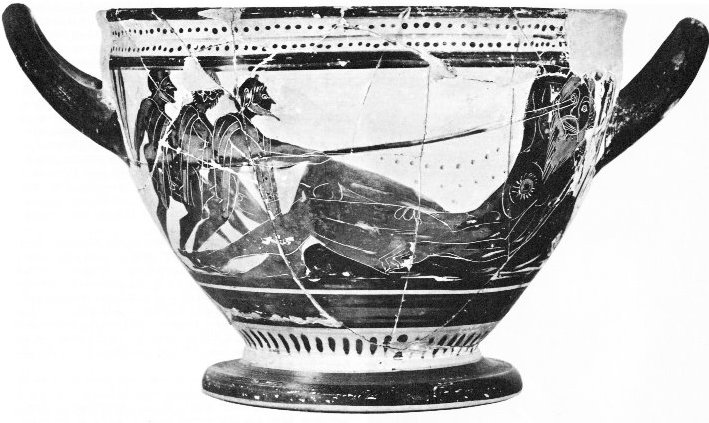
Ba5
(43) + Ba6 (44) + Ba7 (43) + Ba8 (46) =
2 * 88:
|
a1 |
47 |
47 |
127 |
b1 |
31 |
31 |
123 |
|
a2 |
40 |
87 |
167 |
b2 |
47 |
78 |
170 |
|
a3 |
37 |
124 |
204 |
b3 |
43 |
121 |
213 |
|
a4 |
40 |
164 |
244 |
b4 |
42 |
163 |
255 |
|
a5 |
43 |
207 |
287 |
b5 |
40 |
203 |
295 |
|
a6 |
44 |
251 |
331 |
b6 |
40 |
243 |
335 |
|
a7 |
43 |
294 |
374 |
b7 |
41 |
284 |
376 |
|
a8 |
46 |
340 |
420 |
b8 |
42 |
326 |
418 |
|
a9 |
49 |
389 |
469 |
b9 |
50 |
376 |
468 |
|
a10 |
32 |
421 |
501 |
b10 |
42 |
418 |
510 |
|
|
b11 |
43 |
461 |
553 |
|
b12 |
45 |
506 |
598 |
|
sum |
421 =
8 + 413 |
sum |
506
= 92 + 414 |
The
number of glyphs on the B tablet is
421 + 506 = 927 (→ 92 weeks = 644
nights = 280 + 364 days).
|
421 |
-
8 |
413 → 14 * 29½ |
|
506 |
-
92 |
414 → Bharani |
|
421 + 8 + 506 + 92 =
1027 = 13 * 79
... Ecclesiastically,
the equinox is reckoned
to be on 21 March (even
though the equinox
occurs, astronomically
speaking, on 20 March in
most years) ... |
The day of solstice (June 21,
172) was 92 days after March 21
(80).
92 * 7 = 644 = 161 * 4.
... The month, which takes its
name from Juppiter the oak-god,
begins on June 10th [161] and
ends of July 7th. Midway comes
St. John's Day, June 24th, the
day on which the oak-king was
sacrificially burned alive. The
Celtic year was divided into two
halves with the second half
beginning in July, apparently
after a seven-day wake, or
funeral feast, in the oak-king's
honour ...
.jpg)
... I wan't a
clean cup, interrupted the
Hatter:
let's all move one place on.
He moved as he spoke, and the
Dormouse followed him: the March
Hare moved into the Dormouse's
place, and Alice rather
unwillingly took the place of
the March Hare. The Hatter was
the only one who got any
advantage from the change; and
Alice was a good deal worse off
than before, as the March Hare
had just upset the milk-jug into
his plate
...
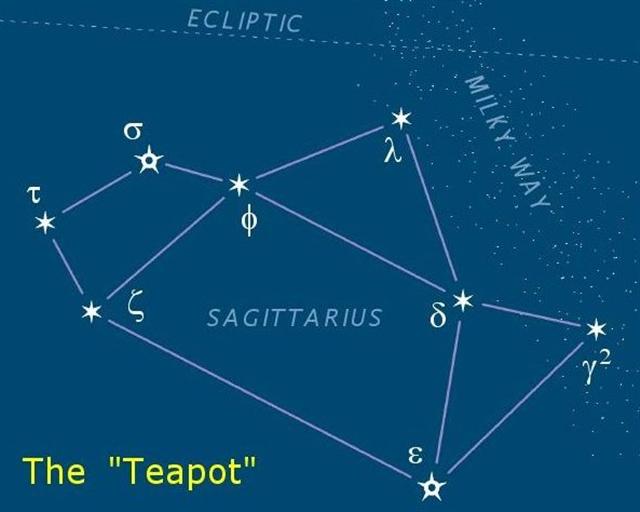
|
|
he
too mai a
Pure ō. a Pure.ki.a Pure vananga(-) |
[Pure
Ō, Pure ki,
and Pure vananganaga left (land behind),
(they)
launched the canoe and sailed to Hiva,] |
|
nanga.he
hoa i te vaka.he oho.ki hiva. |
|
Too.
1. To adopt, to take,
to acquire, to admit, to accept, to
gather, to dispose, to seize, to pull
up, to extirpate, stripped, to withdraw,
to intercept, to frustrate, to touch, to
employ, to serve; tae too, to
renounce. Mq.: too, to take, to
receive, to accept, to adopt, to seize,
to pull up. 2. Raa too,
noon. 3.
Numeral prefix. P Mgv.: toko, id.
Mq.: toko, too, id. Ta.:
too, id. Samoa and Futuna use
to'a and toka, Tonga and Niuē
use toko, and the remainder of
Polynesia uses the latter form. Tooa:
kai tooa, intact, entire, whole;
paea tooa, to deprive. Churchill. |
|
i te porima o te
raa.o ruti. i oho.ai te vaka. |
The canoe of Pure O
left [i
oho.ai] on
the fifth day of November ('Ruti'). |
|
o Pure o.i
oho.era te vaka.o Pure ō.i
tomo era. |
After the canoe of
Pure O had sailed [i
oho.era te vaka.o Pure
ō.] and
had anchored [tomo
= to make landfall] out in the bay [i
tomo era.ki mua ki te hanga],
in Hanga Moria One [ki
hanga moria one],
Pure saw the figure [he
ui a Pure ō.ko te moai],
which had been lying there all this time
[e
moe no ana],
and said to his younger brothers (ngaio
taina), 'Let's go my friends (hoa),
let's break the neck [hahati
atu te ngao]
of this mean one (or, ugly one,
rakerake). |
|
ki mua ki
te hanga ki hanga moria one.he ui |
|
a Pure ō.ko
te moai e moe no ana.he ki ki ta(-) |
|
u
ngaio.taina era.he ro korua.e aku hoa e. |
|
ki hahati
atu te ngao o te
rakerake era.ki he. |
|
Garo. 1. To
disappear, to become lost. He tere,
he garo. He ran away and
disappeared. He û'i te Ariki, ku garo
á te kaíga i te vai kava. The king
saw that the land had disappeared in the
sea. I te ahiahi-ata he garo te raá
ki raro ki te vai kava. In the
evening the sun disappears under the
sea. Ku garo á te kupu o te tai i a
au. I have forgotten the words of
the song (lit. the words of the song
have become lost to me). Ina koe ekó
garo. Don't disappear (i.e. don't
go), or: don't get lost on the way. 2.
Hidden. Te mana'u garo, hidden
thoughts. Kona garo o te tagata,
'people's hidden places': pudenda.
Vanaga. To disappear, to stray, to omit,
to lose oneself, to pass, absent, to
founder, to drown, to sink; garo noa,
to go away forever, to be rare; garo
atu ana, formerly. Hakagaro,
to cover with
water; hakagaro te rakerakega,
to pardon. Garoa, loss, absence,
to be away, to drown, not comprehended,
unitelligible. Garoaga, setting;
garoaga raa, sunset, west.
Garoraa, the sun half-set.
Garovukua, to swallow up. Churchill.
Rake,
rakerake: 1. Bad, ugly, unjust; to
turn nasty (of a situation); ku
rakerake-á a haho a te tai, the sea
has turned rough. 2. To be abundant:
ku rakerake-á te îka, there are lots
of fish. Rakerakega, wickedness.
Vanaga. Bad, in its most general sense;
patu toona rake, immodest, to
expose the person obscenely; rakega,
evil, perversity; rakerake,
abominable,
frightful, low, shocking, culpable,
crime, debauchery, dishonor, fault,
hideous, ignoble, deformed, illicit,
immodest, immoral, impious, irreligious,
lascivious, evil, bad, obscene, sinful,
ugly; rakerakega, sin, cirme,
fault, impiety, iniquity, evil, vice;
hakarakerake, causative, to make
bad, etc. Pau.: marakerake,
afflicted, disconsolate. Churchill. |
|
a.tatou i
hoki atu ai ki te pito o te kainga. |
Why should we return
[ki
he.a.tatou i hoki atu ai]
to that fragment of earth (te pito o
te kainga), i.e. Easter Island? Let
us stay in our (home)land!' [he
noho ro ai tatou i to tatou kainga.]
|
|
he noho ro
ai tatou i to tatou kainga. |
|
i oho.era
te vaka o Pure ō.he hakaunga atu |
After the canoe of
Pure O had departed [i
oho.era te vaka o Pure ō.],
King Hotu contacted [he
hakaunga atu]
his guardian spirits (atua akuaku),
first Kuihi and, second Kuaha. [ko
kuihi.katahi.ko kuaha.karua.] |
|
te ariki a
Hotu.i toona atua
akuaku. |
|
ko
kuihi.katahi.ko kuaha.karua. |
|
i roto i a
Ika hiva.rua.te ki nei.o kuihi.o kuaha. |
Here the story of
Kuihi and Kuaha is taken over by Ika
Hiva (i.e., by another narrator.) [???]
[? From the midst
of the cave of Ika Hiva came the
speech of Kuihi and Kuaha.
To be abundant: ku rakerake-á te îka,
there are lots of fish.] |
|
Aku. Spirit of
the otherworld (good or evil). Ki a
au te ákuáku oga apó. I have a dream
of bad omen last night. Vanaga. 1.
Ambition. 2. Soul, shade, ghost,
specter, immaterial, spiritual.
Churchill. The spiritual component of a
person after he or she has died, i.e.
his or her 'ghost'. Bierbach.
Rapa Nui
and Ra'ivavae are the only
Polynesian islands where the term
akuaku or a'u and a'ua'u
respectively is applied to numinous
beings which are believed in by the
islanders, from time immemorial up to
this day, at least on Rapa Nui.
To the best of our knowledge,
Pukapuka in the northern Cook
Islands is the only other island where
there is a 'lesser ancestral god' or
atua tangata named Te Akuaku
said to have been a 'foreign god who
came from Akalava (Mangaia?)'.
According to the Rapa Nui
dictionaries, akuaku means 'noise
when swallowing', 'ambition', 'soul,
shade, ghost, specter, immaterial,
spiritual' ... there is no literary or
lexical evidence from Rapa Nui
which allows for a more precise
definition of the term akuaku,
and the present day inhabitants of the
island are completely unaware of the
semantics of the word. We are compelled,
therefore, to compare the Rapa Nui
evidence with that of other Polynesian
islands, in order to determine the basic
meaning of the word akuaku and
thus, gain an insight into the
underlying idea of the phenomenon so
denominated.
The word akuaku occurs
semantically cognate in several
Polynesian languages. In Mangareva we
find it as an adjective meaning 'thin;
slender' 'said of men and women only'
and the Marquesan dictionary says
'mince, fluet; 'enana akuaku,
homme fluet'. About the phonetically
corresponding and semantically similar
Tongan form of the word Churchward says:
a'ua'u, ... (of persons) old and
feeble, more or less decrepit, ... a
stage beyond luku. And luku,
again is defined as 'old and weak: of
persons, horses, and boats, but not of
trees or houses'.
The older dictionary by Rabone has
au (a'u) meaning 'old people;
weak and aged persons' or 'old,
ripe'.Desmedt, in speaking of Mangareva,
comments on the term akuaku and
relates it explicitly to that of Rapa
Nui when he says:
le terme
courant par lecquel on désignait ces
esprits-fantômes change avec les
archipels: Tahiti, les Marquises, les
Gambier ont leur mot différent et l'Ile
de Pâques est seule à les nommer
aku-aku. Or, il semble que le sens
étymologique de akuaku soit
'mince'. Dans la langue des Gambier, si
proche de celle de l'Ile de Pâques,
aku-aku veut dire 'mince, en parlant
des personnes' ...; en marquisien,
aki-aki signifie aussi mince, fin
... N'est-ce pas que cette étymologie
répond à la fois à l'idée des
insulaires: esprits = spectres n'ayant
que des côtes .., et aux formes si
émaciées des statuettes anciennes?
This view is appreciated by Emory who
makes the following comment:
G. Maurice
Desmedt reveals himself a keen thinker
... he has performed a service of real
value, and in bringing out clearly the
identity of Easter Island mortuary
practices with those of Mangareva he has
forged one more link in the chain which
binds Easter Island to the basic culture
of Eastern Polynesia.
Roussel provides the following
description of the appearance of the
akuaku in the eyes of the Rapa
Nui people:
Quelle idée
se faisaient-ils des âmes ou des
esprits? Ce n'est pas très clair.
C'était, selon eux, quelque chose de
subtil, une espèce de spectre sans tête,
revêtu seulment de côtes.
and Métraux, on the basis of
Roussel's statement just quoted,
sympathizes with Desmedt when he
remarks:
The name
akuaku, now used indiscriminately
for lesser gods and spirits, must have
meant originally only ghosts or spirits
of the dead, although it is not found
elsewhere in Polynesia with this
meaning. Desmedt ... considers the
Easter Island term akuaku cognate
with the Mangarevan akuaku, which
means 'thin, speaking only of men and
women'. This parallel is supported by
the Easter Island idea in which ghosts
resemble emaciated men.
A still more detailed account of the
Rapa Nui beliefs as to the
appearance of akuaku in this
sense has been recorded from Arturo Teao
by Englert. It is the story of the
'ariki Tu'u ko Iho seeing two
akuaku, Hitirau and Nuko
te Mag ō
who were asleep ...
 |
|
E:89
= 1 + 88
(In
page E:1 was presented the king list
beginning with ko Oto Uta.) |
|
he too mai
a Pure ō.i te pureva.he
ava.ki runga |
Pure O picked up a large round stone (pureva)
and hit the top of the figure. Because
of the stone, the neck of Oto Uta was
broken. |
|
ki te
moai.he hati te ngao.o oto uta.i pureva. |
|
Pure.
Cowrie (Cypraea caput
draconis); pure vaka, another
type of cowrie, which can float on the
sea like a diminutive boat (vaka).
Vanaga. 1. To pray, to supplicate,
invocation, prayer; hare pure,
church, chapel; tae pure,
irreverence; purega, prayer P
Pau., Mgv., Mq., Ta.: pure, to
pray. In Samoa, Tonga, Niuē,
Futuna, Uvea, pule
means to command. 2. A shell T. P
Pau.: hakapurepure, to dye, to
color. Mq.: pué, the porcelain
shell. Ta.: pure, a mark.
Purepure, spotted, dappled; ragi
purepure, dappled sky. Purepurea,
spotted. P Pau.: hakapurepure, to
dye, to color. Mgv.: purepure,
printed cloth; akapurepure, to
paint in different colors. Mq.:
puépué, covered with pale scars.
Ta.: purepure, spotted, dappled.
Churchill.
Pureva, rock, stone (small
enough to be thrown by hand). Vanaga.
Pureva,
to throw a stone. Ta.:
Pureva,
to be on the eve of going. Ha.:
puleva,
to float here and there. Churchill.
Pau.: Pure-hiva, a butterfly.
Mgv.: pure-rehue, id. Ta.:
pure-hua, a moth. Mq.: pure-hua,
id. Ma.: pure-hua, id. Churchill.
|
|
he
hū te
tokerau.he
ketu te vave.he hati te vave. |
Then the wind started blowing, the
billow rose, the waves broke, and the
rain started falling, the flame (i.e.,
lightning) shone brightly, and the
thunder rolled. |
|
he
hoa te
ūa.he nomo mai mai te ura.he hati |
|
he hetu te
patiri. |
|
Ó; 1. Prepositon marking the
genitive. 2. Preposition expressing the
cause, the reason: because of (also i):
e-tahataha-á te vaka o te tokerau.
the boat rocks from side to side
because of the wind. 3. Lest, in order
not to... e-ûi koe o higa, be
careful not to fall. 4. Sometimes used
as conditional: if, whether; ina kai
agiagi au o tu'u-mai te Matu'a, I
don't know if the Padre has arrived. 5.
Article sometimes used preceding proper
names; ó Hotu Matu'a, ó Santiago.
6. To answer saying 'oh'; ana ragi te
tagata ki te rua tagata, 'hé koe?',
he-ó-mai, he-kî: 'ó, î au', when a
man calls another, asking 'where are
you?' (the other) answers saying 'oh, I
am here'. O; to celebrate a
festival: he-o i te gogoro.
Vanaga. 1. Tai o, rippling water.
(Compare in some sea sense - Mgv.:
akao, a narrow arm of the sea, to
throw stones into the water in order to
drive fish into a net.) 2. Of. Mgv.,
Mq., Ta.: o, of. 3. A verb sign;
o mua, at first; ina o nei,
to be away (not-being-here). Churchill.
Hu. 1. Breaking of wind. T Mgv.,
uu, to break wind. Mq., Ta.:
hu, id. 2. Whistling of the wind, to
blow, tempest, high wind. P Pau.:
huga, a hurricane. Churchill. Mgv.:
hu, to burst, to crackle, to
snap. Ha.: hu, a noise.
Churchill.
Toke.
To steal; thief; toketoke,
to repeatedly steal things of little
value; vî'e toke kenu, adulterous
woman (lit.: woman who steals husbands).
Vanaga. Toke. To dupe, to extort,
to usurp; toketoke, to steal, to
rob, to extort, to defraud, to spoil,
thief. Tokea, a dupe. Tokenoho,
intruder. Churchill.
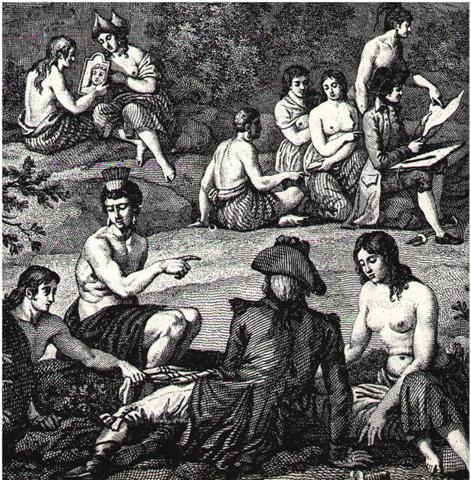
Ketu. To bound, to climb over,
to leap, to jump, to raise (keetu).
Mq. ketu, to raise, to lift.
Ketuketu, to spread out, hihi
ketuketu, to turn back the
eyelids. Churchill. Pau.: Ketuketu,
to dig. Ta.: etuetu, id. Mq.:
ketu, to dig up with the snout. Ma.:
ketu, id. Churchill. Mq.:
ketuketu, to snuff a candle. Sa.:
eueu, id. Churchill.
Hoa.1. Master, owner;
tagata hoa papaku, owner or
relative of a dead; hoa manu,
'bird master', that is, he who received
the first egg at the annual festivals in
Orongo; he to'o mai e te hoa
manu i te mamari ki toona rima, he ma'u,
he hoko, the 'bird master' receives
the egg in his hand and carries it,
dancing. 2.Friend,
companion: e ga hoa ê! 3. To cast away, to throw
away, to abandon, perhaps also to
expel. 4. To confess a sin; he
hoa i te ta'u: term used of a
category of rongorongo boards
(see ta'u). Vanaga. 1.
Friend; repa hoa, friend (male),
comrade, companion, fellow; to confide;
repa hoa titika, faithful friend;
garu hoa, friend (either sex);
uha hoa, friend (female); hoa
kona, native T. 2. To abandon, to
debark, to cast, to launch, to anchor,
to let go, to give up, to reject, to
repudiate, to suppress, to cut off, to
jerk out, to proscribe, to reprove;
hoahoa, to upset, to destroy.
Churchill.
Tiri,
Mgv.: To throw away, to
reject, to neglect. Ta.: tiri, to
cast a small net. Mq.: tii,
titii, to throw away, to abandon, to
reject. Sa.: tili, a small net
and its cast. Ma.: tiri, to throw
one by one. Titiri, to abandon,
to abjure; rima titiri, to walk
with the hands behind the back. T Pau.:
titiri, to abandon, to leave, to
abjure, to deny. Mgv.: tiri, to
throw away, to reject, to neglect, to
lose. Mq.: tií, titií, to
throw away, to reject, to abandond, to
leave behind. Ta.: titiri, to
reject, to throw away. Churchill. |
|
i hu era te
tokerau.i hati era te vave.i
ava |
As soon as the wind started blowing, the
waves broke, the rain fell, and the
thunder rolled, King Hotu knew that Pure
O had done harm to Oto Uta [penei
ē.ku kori ana a Pure ō.i te ariki.i a
oto uta]. |
|
era te ua.i
hetu era te
hātu.tiri |
|
he
angiangi
e te ariki.e Hotu.penei ē.ku kori ana |
|
a Pure ō.i
te ariki.i a oto uta. |
|
Rau
1. (Also: raupá) leaf of a plant,
stem and leaves. 2. Hundred: e tahi
te rau, e rua te rau, etc., 100,
200... Also seems to have been used in
the meaning of 'many'. Tu'u henua
rau, someone who has travelled to
many countries (such were called in the
19th century natives who had travelled
abroad, employed as sailors). Compare
with: tai raurau-á riki. Vanaga.
Rau
hei. 1. Branch of mimosa. 2.
Killed enemy. 3. Hanged 'fish'. 'Branche
du mimosa (signe de mort), ennemie túe
(poisson suspendu)' according
to Jaussen. Barthel.
Ra'u
1. To take something without the owner's
permission; to seize something forcibly.
2. Ra'u maahu, ancient
expression, literally: to appropriate
the steam (maahu) of the food
just taken out of an earth oven. It
refers to intruders coming to help
themselves uninvited. Warriors off to a
battle used to be told: E ra'u maahu
no koe, o pagaha'a! meaning: 'Eat
little, lest you be heavy (and lose your
agility).' Vanaga. 1. Sa.: la'u,
to clear off, to carry away; la'u
mai, to bring. Uvea: laku,
to send, to throw into. Ha.: laulau,
a bundle, a bag; a wrapper of a bundle,
the netting in which food is carried;
lalau, to seize, to catch hold of.
2. To.: lau, lalau,
lauji, to pinch with the fingers, to
nip. Ha.: lau, to feel after a
thing; lalau, to extend (as the
hand), to seize, to catch hold of. 3.
Sa.: lau, a leaf; lalau,
to be in leaf; laulau, a food
tray plaited from a coconut leaf, to set
out food on such a tray or on a table.
To.: lau, lou, a leaf;
laulau, a tray. Fu., Uvea, Nuguria:
lau, a leaf. Niuē:
lau,
a leaf; laulau,
a table. Ha.: lau,
a leaf; laulau,
the netting in which food is carried.
Ma., Ta., Rarotonga, Rapanui, Paumotu,
Nukuoro, Fotuna: rau,
a leaf. Mgv.: rau,
rou,
id. Mq.: au,
ou,
id. Churchill 2.
Ta.:
rauhuru,
dry banana leaf. Mq.: auhuu,
id. (To.: hulu,
leaves dry and dead.) Ha.:
lauhulu,
banana leaf. Churchill. Lau,
s. Haw., to feel for, spread out,
expand, be broad, numerous; s.
leaf of a tree or plant, expanse, place
where people dwell, the end, point; sc.
extension of a thing; the number four
hundred; lau-kua, to scrape
together, to gather up from here and
there confusedly; lau-la, broad,
wide, extension, width; lau-na,
so associate with, be friendly;
lau-oho (lit. 'leaves of the head'),
the hair. Tong., lau, low,
spread out, be broad, exfoliate; s.
surface area; lau-mata, eyelash;
lo, a leaf; lo-gnutu, the
lips (lit. 'leaves of the mouth'). N.
Zeal. and Mang., rau, spread,
expand; raku-raku, to scratch,
scrape. Sam., lau, leaf, thatch,
lip, brim of a cup, breadth, numeral
hundred after the first hundred;
lau-a, to be in leaf, full-leafed;
laua-ai, a town, in opposition to
the bush; lau-ulu, the hair of
the head; launga-tasi, even,
level; lau-lau, to lay out,
spread out food on a table; lau-tata,
a level place on a mountain or at its
foot; lau-le-anga, uneven;
lau-talinga, the lobe of the ear, a
fungus; lau-tele, large, wide,
common, of people. Tah., rau, a
leaf, a hundred; when counting by
couples, two hundred; many indefinitely;
rau-rau, to scratch. Fiji., lou,
leaves for covering an oven; longa,
a mat, a bed for planting; drau,
a leaf; drau-drau, leaves on
which food is served up, also a hundred.
Saparua., laun, leaf. Mal.,
daun, id.; luwas, broad,
extended. Sunda., Rubak., id., Amboyna,
ai-low, id. Malg., rav,
ravin, leaf; ravin-tadign,
lobe of the ear; lava, long,
high, indefinite expression of
extension; lava-lava, eternal;
lava-tangh, a spider. The word
lau, in the sense of expanse, and
hence 'the sea, ocean', is not now used
in the Polynesian dialects. There
remain, however, two compound forms to
indicate its former use in that sense:
lau-make, Haw., lit. the abating
or subsiding of water, i.e., drought;
rau-mate, Tah., to cease from rain,
be fair weather; rau-mate, N.
Zeal., id., hence summer. The other word
is koo-lau, Haw., kona-rau,
N. Zeal., toe-rau, Tah., on the
side of the great ocean, the weather
side of an island or group; toa-lau,
Sam., the north-east trade wind. In
Fiji, lau is the name of the
windward islands generally. In the Malay
and pre-Malay dialects that word in that
sense still remains under various forms:
laut, lauti, lautan,
lauhaha, olat, wolat,
medi-laut, all signifying the
sea, on the same principle of derivation
as the Latin æquor,
flat, level, expanse, the sea.
Welsh, llav, to expand; lled,
breadth. Armor., blad, flat,
broad. Lat., latus, broad, wide,
spacious. Greek, πλατυς, wide,
broad, flat; πλατη, broad
surface, blade of an oar; πλακοσ,
broad, flat. Pers., lâtû, blade
of an oar, oar.Lith., platus,
flat. Sanskr., prath, be
extended, to spread. Goth., laufs
or laubs, a leaf. Icel., laug,
bath; lauga, to bathe, lögr,
the sea, water, moisture. Bearing in
mind l and n are
convertible in the West Aryan as in the
Polynesian dialects, we might refer to
the following as original relatives of
the Polynesian lau: Sanskr.,
nau, boat, ship; snâ, and its
connections, 'to bathe'. Greek, ναω,
to flow, float; ναω, νεω,
to swim, to spin; νευσις, s.
swimming; ναυς, ship, &c. Lat.,
no-are, to swim, float. A.-Sax.,
naca, id. O. Norse, snäcka,
a shell, sobriquet of boats and vessels.
Perhaps the Gothic snaga, a
garment. Liddell and Scott and also
Benfey refer the Greek νεω and
Latin neo, 'to spin', to the
Sanskrit nah, 'to bind, tie'.
With due deference, I would suggest that
the underlying sense of 'to bind' and
'tie' is 'to shorten, contract, to knit'
- necto, nodus - and that
the original conception of 'to spin' was
one of extension, lengthening, as
represented in the Polynesian lau.
(Fornander) |
|
Ava. 1. To remain (of dregs, of
very small objects in the water or in a
place which used to be full of water);
he-ava, he-paroparoko,
expression, said when small fishes swarm
in the water holes along the coast. 2.
Furrow, rut, groove, crevice, fissure;
he-hahata te ava o te henua, a
crevice opened in the ground. 3. To
strike, to hit; to sound like a blow;
ku-ava-á te poko (see also
hatutiri), thunder sounded. Vanaga.
Áva-áva. 1. To lift up. 2. to
strike, to hit repeatedly; he-áva-áva
i te koreha a ruga a te ma'ea, he
struck the eel several times against a
stone (to kill it). Vanaga. 1. a)
Distance, distant; ava poto, a
short distance. b) Space, interval. PS
Mq.: ava, distance, space,
interval. Ta.: ava, interval. The
simpler form of the root is va,
which is not found in Rapanui and
Marquesan, and in Tahiti is narrowly
restricted to the spacing of thatch, but
in Nuclear Polynesia and in the
Tongafiti migration [va] is
expressive of the sense of distance and
interval. In Samoa the same meaning is
carried by an advanced form of the root,
and ava in this sense is not
found elsewhere. Its reappearance in
these three languages of Southeast
Polynesia points to a direct migration
from Samoa. 2. Channel, strait, pass,
passage, breach, entrance to a harbor.
Avaava. 1. a) To strike, to slap,
to grind, to dent. b) To correct, to
maltreat, to exterminate. 2. Angle,
chink. 3. Tobacco. In this nook of
Polynesia tobacco and its common method
of pleasurable use are alike imported.
In Melanesia tobacco was indigenous but
was employed for the business of
medication and not to assuage the
conditions of cannibal society. The
leaves when fully grown were shredded,
macerated and employed as a cataplasm.
Applied upon the abdomen it was the
principal agency in the production of
emesis and catharsis. Applied secretly
in axilla [arm-pit] it superinduced the
ecstasy of the priest when in the trance
of possession by his god. In Fiji it was
used as an insecticide. Avahi, a
wedge, to split; avahiga, part,
partial; avahiga kore,
inseparable. Avamouga (ava
1 - mouga 2), valley. Churchill.
1. Awa, s. Haw., harbour, cove,
creek, channel; awaa, to dig as a
pit, a ditch; awawa, a valley,
space between two prominences, space
between the fingers and toes. Tah.,
ava, a harbour, channel. Sam.,
ava, a boat-passage, opening in the
reef, anchorage; v. to be open, as a
doorway. Marqu., ava, interval,
passage. The Malgasse ava, a
rainbow, may refer to this family, in
the sense of an arch, a bay, a hollow,
curved space on the firmanent. Sanskr.,
avaţa, a pit; avata, a
well; avatas, below, in the lower
regions; ava-kâça,
space, interval; avama,
low, opp. to high, probably all
referring themselves to ava,
prep. with the primary sense of 'down,
below, away, off', as its derivatives
plainly indicate.
2.
Awa,
s. Haw., fine rain, mist. Tong., Sam.,
afa,
storm, hurricane; afu,
a waterfall. N. Zeal., awa,
a river. Fiji., cava,
a storm. Mal., awap,
mist, dew. Sangvir Island,
sawan,
a river. Rotti, Ofa, id. Tagal.,
abo-abo,
rain. Malg., sav,
mist, fog.
Sanskr.,
ap,
apas,
water.
Lat.,
aqua;
Romain, ava,
water, rain-water.
Goth.,
ahwa;
O. H. Germ., ouwa,
water. Germ., aue,
au,
brook. Swed., å, id.
Irish,
abh,
water; abhan,
river. Welsh, aw,
fluid.
Pers.,
âw,
âb,
water.
A. Pictet
... refers the Celtic and Persian forms
to a Sanskrit root av,
'ire',
whence avana,
rapidity, avani,
river; and he refers the Latin and
Gothic forms to a Sanskrit root
aç
or ak,
'permeare, occupare',
from which spring a number of
derivatives expressive of 'le
mouvement rapide, la force pénétrante'
...
In view of the Polynesian forms, Haw.,
Sam., Tagal., and their meanings, I
prefer to follow Benfey and Bopp in
referring the West Aryan as well as the
Polynesian forms to the Sanskrit
ap,
whether that be the original form itself
or a contracted modification of it.
It seems to
me to have been in the very nature of
language that men in the olden times
should have commenced by giving distinct
and instantaneous names to objects
around them, and to natural phenomena,
before they invested those objects with
names derived by after-thought and
reflection from this or that quality
characteristic of those objects. Many,
if not most, of such original names were
doubtless lost in the course of ages,
and supplanted by synonyms derived from
and expressive of some quality or other
in the objects named; but many still
survive to baffle the analysis of
philologists, and to assert their claims
to priority over synonyms that must
necessarily have been of later formation.
3. Awa,
s. Haw., Sam., Tah., name of a plant of
a bitter taste, but highly relished
throughout Polynesia - 'Piper
Methysticum' - from which an
intoxicating drink is made; the name of
the liquor itself. Tong., N. Zeal.,
Rarot., Marqu., kawa, id. Haw.,
awa-awa, bitter. Sam., a'awa,
id. Tong., N. Zeal., kakawa ,
sweet.
Sanskr.,
av, to please, satisfy, desire
(Benfey); ava, nourishment
(Pictet).
Pers.,
âwâ, nourishment; abâ, bread.
Lat.,
aveo, crave after, long for;
avena, oats. See au 1.
Fornander Hetu 1. To (make)
sound; figuratively:
famous, renowned. 2. To crumble into embers (of a
bonfire). Hetu'u. Star,
planet; hetu'u popohaga
morning star; hetu'u ahiahi evening star; hetu'u viri
meteorite. Vanaga. Hetu 1. Star (heetuu);
hetu rere, meteor; hetu pupura,
planet. P Pau.: hetu, star. Mgv.:
etu, id. Mq.: fetu,
hetu, id. Ta.: fetu, fetia,
id. The alternative form fetia in
Tahiti, now the only one in common use,
need not be regarded as an anomaly in
mutation. It seems to derive from
Paumotu fetika, a planet. Its
introduction into Tahiti is due to the
fashion of accepting Paumotu vocables
which arose when the house of Pomare
came into power. 2. Capital letter (?
he tu). 3. To amuse. 4. To stamp the
feet. Hetuhetu, to calk, to
strike the water. Hetuke, sea
urchin. Churchill.
Hatu. 1. Clod of earth;
cultivated land; arable land (oone
hatu). 2. Compact mass of other
substances: hatu matá, piece of
obsidian. 3. Figuratively: manava
hatu, said of persons who, in
adversity, stay composed and in control
of their behaviour and feelings. 4. To
advise, to command. He hatu i te
vanaga rivariva ki te kio o poki ki ruga
ki te opata, they gave the refugees
the good advice not to climb the
precipice; he hatu i te vanaga
rakerake, to give bad advice. 5. To
collude, to unite for a purpose, to
concur. Mo hatu o te tia o te nua,
to agree on the price of a nua
cape. 6. Result, favourable outcome of
an enterprise. He ká i te umu mo te
hatu o te aga, to light the earth
oven for the successful outcome of an
enterprise. Vanaga. 1. Haatu,
hahatu, mahatu. To fold, to
double, to plait, to braid; noho hatu,
to sit crosslegged; hoe hatu,
clasp knife; hatuhatu, to deform.
2. To recommend. Churchill. In the
Polynesian dialects proper, we find
Patu and Patu-patu, 'stone',
in New Zealand; Fatu in Tahiti
and Marquesas signifying 'Lord',
'Master', also 'Stone'; Haku in
the Hawaiian means 'Lord', 'Master',
while with the intensitive prefix Po
it becomes Pohaku, 'a stone'.
Fornander.
Tiri.
Mgv.: To throw away, to
reject, to neglect. Ta.: tiri, to
cast a small net. Mq.: tii,
titii, to throw away, to abandon, to
reject. Sa.: tili, a small net
and its cast. Ma.: tiri, to throw
one by one. Titiri, to abandon,
to abjure; rima titiri, to walk
with the hands behind the back. T Pau.:
titiri, to abandon, to leave, to
abjure, to deny. Mgv.: tiri, to
throw away, to reject, to neglect, to
lose. Mq.: tií, titií, to
throw away, to reject, to abandond, to
leave behind. Ta.: titiri, to
reject, to throw away. Churchill.
... if, whether; ina kai
agiagi au o tu'u-mai te Matu'a, I
don't know if the Padre has arrived.
Vanaga. |
|
he ki a
Hotu.ku kori ana tau ngaio era i te
ariki |
Hotu spoke, 'These fellows have done a
mean thing [ku
kori ana tau ngaio era] to King Oto Uta!" |
|
i a oto
uta. |
|
i hati era
te ngao.o te ariki o oto uta.he ōho.atu |
After the neck of Oto Uta had been
broken, Kuihi and Kuaha arrived. They picked
up the neck of King Oto Uta, took it,
and brought it with them. |
|
a kuihi.a
kuaha.he too mai i te ngao.o te a(-) |
|
riki o oto
uta.he mau he ōho.mai he tuu ki |
|
Gao. 1. Neck. 2. Glans penis (te
gao o te kohio), neck of penis.
Vanaga. Neck, throat, (naho G);
gao pukupuku, scrofula; hore
te gao, to cut the head off;
arakea gao, scrofula. Gaogao,
calm. Gaoku, to eat greedily.
Gaopu, to choke on a bone.
Churchill. |
|
mua ki te
hanga.ki hanga rau.i haka rere ai |
They arrived out in the bay [he
tuu ki mua ki te hanga], in Hanga
Rau. (There) Kuihi and Kuaha left (the
fragment). |
|
e kuihi.e
kuaha. |
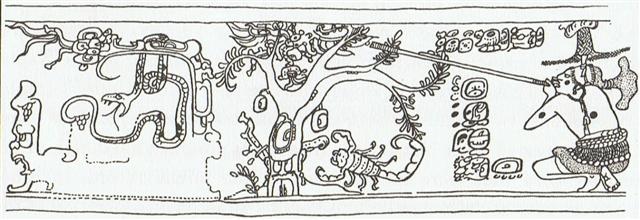
... This pot depicts one of
the Hero Twins (One-Ahaw in the Classic texts
and One-Hunaphu in the K'iche' Popol Vuh) and a
great bird who is trying to land in a huge ceiba
tree heavy with fruit. This mythical bird is
Itzam-Yeh, Classic prototype of
Wuqub-Kaqix, 'Seven-Macaw', of Popol Vuh
fame. In that story, in the time before the sky
was lifted up to make room for the light, the
vainglorious Seven-Macaw imagined himself to be
the sun. Offended by his pride, the Hero Twins
humbled him by breaking his beautiful shining
tooth with a pellet from their blowgun. This pot
shows One-Ahaw aiming at the bird as he swoops
down to land in his tree. As Itzam-Yeh
lands on his perch, the text tells us he is
'entering or becoming the
sky'.
|



.jpg)



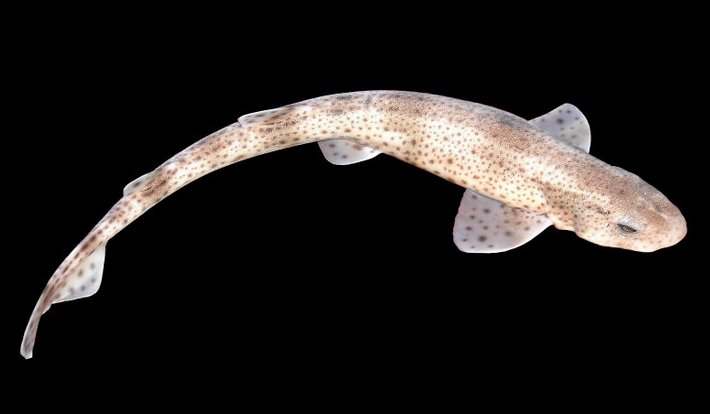
.jpg)

